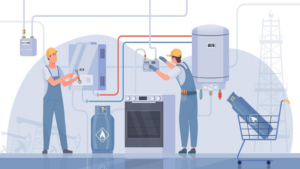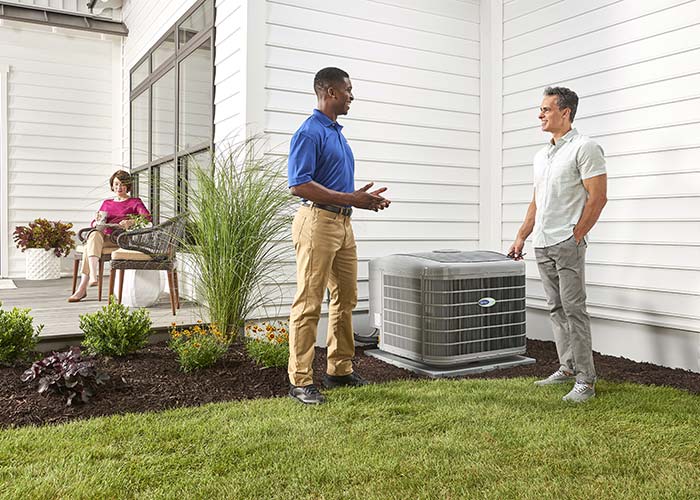What Maintenance Does an Air Conditioner Need?
With the hot summer months fast approaching, it’s essential to maintain your air conditioner to ensure it’s running efficiently and keeping your home cool. In this comprehensive guide, we will discuss the maintenance air conditioning systems require and why it’s crucial to keep your air conditioner in top shape. This article will cover everything from cleaning air filters to checking your evaporator coil, and even some tips on how to save money on energy costs.

The Importance of Regular Air Conditioner Maintenance
Regular air conditioner maintenance is vital to ensure the longevity and efficiency of your cooling system. A well-maintained air conditioning system not only provides cool air during the sweltering summer months but can also reduce energy costs and potentially save money on utility bills. Maintenance tasks will vary depending on the type of air conditioner you have, whether older models such as central air conditioners, window units, or heat pumps. Regardless of the type, all air conditioners benefit from regular maintenance to prevent issues such as block airflow, clogged filters, and decreased efficiency.
4 Ways to Service Your AC Yourself
Even if you schedule yearly maintenance frequently, you can still improve efficiency of AC systems throughout the year by using a simple maintenance routine for a more efficient system.
Cleaning and Replacing Air Filters
One of the most important maintenance tasks for your air conditioner is cleaning or replacing the air filters. .Dirt reduces airflow and dirty filters can reduce your AC’s efficiency, leading to higher energy bills and more strain on the system. It’s crucial to routinely replace or clean air filters to ensure your air conditioning unit is working efficiently. The frequency with which you should change or clean your filters will depend on factors such as the air quality in your area, family members with allergies, and the presence of pets in your home. In general, it’s a good idea to check your air filters every month and replace them as needed, especially during the cooling season when your AC is in constant use.

Inspecting and Cleaning the Evaporator Coil
The evaporator coil is another essential component of your air conditioner that requires regular maintenance. The air conditioner’s evaporator coil absorbs heat from the air, helping to cool your home. Over time, the evaporator coil can collect dirt, reducing its ability to absorb heat and decreasing your system’s efficiency. It’s crucial to check and clean the evaporator coil annually, preferably before the cooling season begins. To clean the evaporator coil, you can use a soft brush or a specialized coil cleaner, ensuring that you carefully follow the manufacturer’s instructions.

Maintaining the Outdoor Unit and Condenser Coils
The outdoor unit of your air conditioning system, which houses the condenser coil, is also an important maintenance task. The condenser coils are responsible for releasing the heat absorbed by the evaporator coil, helping your air conditioner run efficiently. However, outdoor condenser coils can become dirty due to their exposure to the outdoor environment, including dust, foliage, and other debris. It’s essential to clean the condenser unit and coils at least once a year, preferably before the cooling season begins.
To clean the condenser coils, turn off the power to your air conditioning unit and use a garden hose to gently rinse away any dirt or debris. Avoid using a power washer, as the high pressure can damage the delicate aluminum fins on the coil. If the coil fins are easily bent or damaged, you can use a fin comb to straighten them out, helping to improve airflow and efficiency.
Checking the Electrical Lines and Fan Motor
Another most important maintenance task done for your air conditioner is inspecting the electrical lines and fan motor. Loose or damaged electrical connections can lead to reduced efficiency or even pose a fire hazard. It’s a good idea to have an HVAC technician check the electrical lines annually to ensure they are secure and in good condition.
Similarly, the fan motor should be inspected and lubricated as needed to ensure smooth operation. A malfunctioning fan motor can result in decreased airflow, causing your air conditioner to work harder and use more energy. It’s best to have a qualified HVAC technician perform this task during routine maintenance to keep your AC system running efficiently.
Clearing the Area Surrounding the Outdoor Unit
The area surrounding your outdoor unit should be kept clear of any debris, foliage, or other obstructions that could block airflow and reduce your air conditioner’s efficiency. Ensure that there is at least a 2-foot clearance around the unit, and routinely trim any bushes or plants that may be growing too close. Additionally, check for any dirt or debris build-up on the unit itself and clean it off as needed.
Installing a Smart Thermostat
One way to potentially save money on your energy bills while also maintaining your air conditioner is to install a smart thermostat. A programmable thermostat allows you to set specific temperature preferences for different times of the day, ensuring that your air conditioner system isn’t working harder than necessary when you’re not at home or during cooler periods. This can not only help reduce your energy costs but also lessen the strain on your AC system, prolonging its lifespan.


Window Seals for Room Air Conditioners
During each cooling cycle, check the seal of the cooling unit against the window lining to see whether it touches the unit. Moisture damages the window frame seal and lets the cool air out of your home.
Know When to Call a Professional
While regular DIY maintenance can help keep your air conditioner in good shape, there are times when it’s essential to call in a professional. Professional inspections and maintenance play a crucial role in ensuring your air conditioning system’s longevity, efficiency, and overall performance. By enlisting the help of experts, you can prevent minor issues from turning into more significant, costly problems.
Provincial Smart Home Services, provides a comprehensive range of services tailored to your air conditioning needs. Their experienced technicians have the skills and expertise necessary to identify potential issues and address them before they escalate.

Conclusion
Proper maintenance of your air conditioner is essential to keep it running efficiently, providing cool air throughout the hot summer months, and reducing your energy costs. By following these maintenance tips, you can ensure that your air conditioning unit is in top shape, helping you to stay comfortable and potentially save money on your utility bills. Remember, some tasks are best left to professional HVAC technicians, so don’t hesitate to schedule regular maintenance visits to keep your system running at peak performance.
FAQs
1. What maintenance should I do on my air conditioner and how often is it needed?
To maintain your air conditioner, you should clean or replace air filters regularly, check and clean the evaporator and condenser coils, inspect electrical lines and the fan motor, and clear the area surrounding the outdoor unit. Generally, it’s recommended to schedule professional HVAC maintenance at least once a year, preferably before the cooling season begins. However, air filters should be checked monthly and replaced as needed.
2. Is it OK to spray water on your air conditioner while running?
It’s acceptable to spray water on your air conditioner’s outdoor unit to clean the condenser coils, but ensure the power is turned off before doing so. Avoid using a power washer, as the high pressure can damage the delicate aluminum fins on the the coil fins. Instead, use a gentle stream from a garden hose to rinse away dirt and debris.
3. What is annual maintenance on an air conditioner, and what should I expect during a service visit?
Annual maintenance typically involves a professional HVAC technician checking your air conditioning system for any potential issues and performing necessary maintenance tasks. This includes cleaning and inspecting evaporator and condenser coils, checking electrical connections, the air filter, lubricating the fan motor, and assessing the overall system’s efficiency.
4. How do I know if my air conditioner needs maintenance?
Signs that your air conditioner may need maintenance include reduced cooling performance, strange noises, increased energy bills, or a clogged filter. Regular maintenance helps prevent these issues and keeps your air conditioner running efficiently.
5. How do I maintain my home central air conditioner, and how often do central air conditioners need maintenance?
To maintain a central air conditioner, clean or replace air filters monthly, check and clean evaporator and condenser coils annually, inspect electrical lines and the fan motor, and keep the area around the outdoor unit clear. Central air conditioners, like other types, should receive professional, HVAC system maintenance at least once a year.
6. Can I clean my AC unit myself, and what is the best thing to clean it with?
Yes, you can clean certain parts of your AC unit yourself, such as air filters, evaporator coils, and condenser coils. Use a soft brush or specialized condenser coil cleaner for the coils, and follow the manufacturer’s instructions. For air filters, either replace them or clean them according to the manufacturer’s recommendations.
Related Posts

Furnace Maintenance Tips for the Winter
Prepare for winter—ensure your furnace is set with key maintenance tips: filter changes, thermostat inspections, and regular checks.

Furnace Humidifier 101: Benefits, Considerations, and Tips
Discover furnace humidifiers: types, health/home benefits, installation, and costs for winter air moisture.

Should I Invest in an Energy Efficient Air Conditioner?
An energy efficient air conditioner can save you hundreds of dollars per year on utility bills while reducing your carbon footprint.


No Comments